Digital skills expert: Children need to know that it is in their power to make changes
What exactly are the skills of the future, and what will the children learn in the upcoming third year of the Open Future programme? They will work on their own social innovation, but also many other topics from the digital world. You will learn why all this is important in an interview with Eva Klimeková, who is the guarantor of our programme focused on digital skills.
What skills do you consider to be the skills of the future?
I consider digital skills, critical thinking and the ability to adapt to change to be the skills of the future. Today, technical awareness and digital skills are among the basic requirements for finding a job in the labour market, as almost every sector is already being digitised. At the same time, digital literacy does not only include the ability to work with a computer, but digitally literate people can use technology to their advantage and thus make their work more efficient. They know the pitfalls of the online world; they can search for information and assess its truthfulness. Therefore, it is important to develop critical and analytical thinking, which is currently essential for safe and responsible use in the online world.
How do we get these skills to each student?
The last year has confirmed the importance of these skills in everyday life. I feel that educational institutes still play an important role in their acquisition. The pace of development, dissemination and use of technology in everyday life is faster and faster. The Fourth Industrial Revolution brings many technological innovations, and it is difficult to predict what awaits us in 10 years and what for we need to prepare our children. For this reason, children must be flexible and try to keep up with tech developments.
What is the most important thing children will learn in the third year of the Open Future programme?
When creating content, I focused mainly on the effective and safe use of digital technologies. Some children in the first year of the Open Future programme had only seen a computer at school before, once a week in computer science classes. Therefore, in the first year, we focus mainly on acquainting them with digital technologies and basic computer work, which the pupils will use not only in the centre but also at school. The first year is designed to catch up with peers who have experience with technology but also to overcome fear and break down uncertainty. The second year focuses on the development of algorithmic thinking. It is full of coding in Scratch and creating interesting projects with micro:bits. At the end of the second year, the children will also create a functional prototype of their project. In the third year, we will focus on the further development of their project, the creation of a website and visual identity. We can also get acquainted with technologies, such as 3D printing, artificial intelligence, virtual reality, blockchain, IoT (Internet of Things), and robotics.
What does the programme need to consider in the post-pandemic era? Maybe something that you did not anticipate as content creators in the beginning.
We did not anticipate the transition to distance learning and all the meetings happening online. Consequently, we also included in the content new topics focused on the transition to the online world. On the other hand, this situation provided us with the opportunity to host personalities from other countries and cities, such as the astrobiologist Michaela Musilová who worked in Hawaii, and the writer Daniel Hevier who joined our online meeting from neighbouring Bratislava.
I was also surprised by the rise of the disinformation scene and cyberhate. I think it is a consequence of the lack of digital literacy of people who already know how to work with a computer at a basic level but they lack critical thinking for assessing the truthfulness of the information. There is also a lack of understanding that a written comment works the same way as a spoken word; that it remains written and remembered forever and read by many people. When commenting online, people have an inanimate computer or mobile phone in front of them but their comments and thoughts have a larger and sensitive audience. These topics, the ability to recognise hoaxes and ethical behaviour on the Internet were also originally included in the programme. Currently, we see the need to address them even more than before. However, we can also see a positive change in the fact that the pandemic has accelerated the digital transformation of several areas. And this further confirms the importance of education in this field.
What do children need in the time after the pandemic? Why is it necessary to place more emphasis on experiential learning in education?
In recent months of the pandemic, there has been plenty of negative news and emotions. Many people have lost a family member, a neighbour or an acquaintance. We have no idea what effect this can have on children entering adolescence. They need to compensate for it and experience more positive things. They need to catch up with what they missed during distance education when they could not enjoy joint breaks, school events or trips.
In the third year, children will work on their own social innovation, which should help solve a problem in their surroundings and their communities. How to sensitise young people to the needs of their communities, and why is it important?
In the centre of the Open Future programme, there are children with diverse needs and backgrounds. When looking for a solution to a problem, they work together in groups and identify needs, such as what is lacking somewhere and what could improve the situation in their communities. It is important that children also know that it is in their power to make changes and can help themselves and other members of the community. Anna Frank’s quote can serve as an inspiration here: “How wonderful it is that no one has to wait a minute to start changing the world for the better.”
Who is Eva Klimeková?
Eva Klimeková is the co-founder of the Mini Tech Institute, within which she is the guarantor of the quality of the content and the author of the educational curriculum of the Mini Tech MBA programme. She obtained her PhD degree in the field of Theory of Teaching Informatics at the Faculty of Mathematics, Physics and Informatics of Comenius University. She also worked as a teacher of informatics at the Juro Hronec Grammar School in Bratislava. She is a member of Spy non-profit, co-organiser of the PyCon SK conference and founder of EduSummit. She is a professional guarantor of digital skills for the Open Future programme.
 We can strategically develop the Open Future programme at the Pontis Foundation thanks to the Telekom Endowment Fund, our general partner.
We can strategically develop the Open Future programme at the Pontis Foundation thanks to the Telekom Endowment Fund, our general partner.
Eva Klimeková was interviewed by Miriam Šelepová, a project manager of the Open Future programme. The text is part of a series of interviews with professional guarantors of the programme. The interviews aim to demonstrate how we work with children, what they learn and what skills we emphasise.







